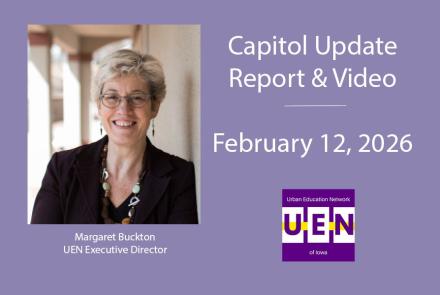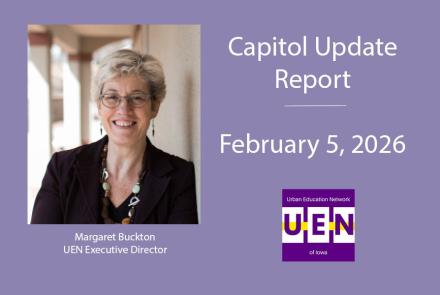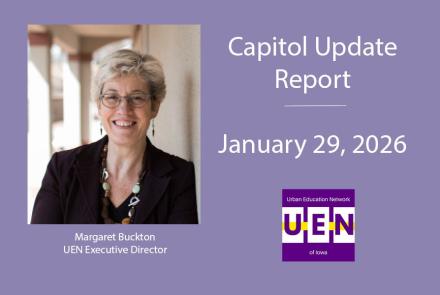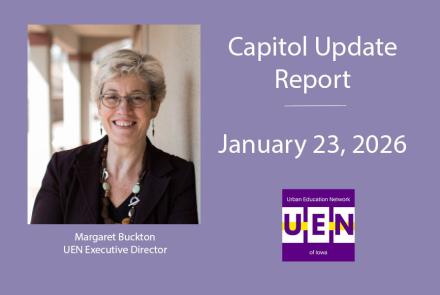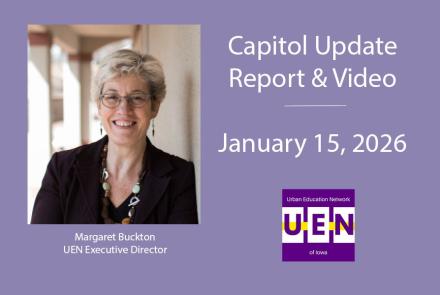Capitol Update - January 13, 2022
UEN Legislative Update
Jan. 13, 2022
In this UEN Weekly Report from the 2022 Legislative Session, find information about:
- Governor’s Condition of the State, SSA and Education Policy Recommendations
- Legislative Timeline
- Bills Introduced and Subcommittees Assigned
- Advocacy Action Steps for This Week
- Links to Advocacy Resources
- Members of the House and Senate Education Committees
The 2022 Session Begins: as the second year of the biennium, all bills introduced last year are alive for consideration until they are sidelined by one of the self-imposed funnel deadlines. The bill list will shorten along the way as bills fail to progress. See the timeline below for these important deadlines.
Governor’s Condition of the State Address State Budget
(source LSA’s Preliminary Analysis of the Governor’s Budget Recommendation FY 2023 https://www.legis.iowa.gov/docs/publications/LAGRP/1285407.pdf)
Some State Budget Statistics
- Combined Reserve Fund Balances: $801.1 million in FY 2021 (actual) and estimated $816.9 million FY 2022 and $897.9 million FY 2023.
- Taxpayer Relief Fund Balances: $90.4 million in FY 2021 (actual) and estimated $1.054 Billion in FY 2022 and $1.946 Billion in FY 2023.
- Appropriation Recommendations: The Governor is recommending total state General Fund Appropriations of $8.202 Billion for FY 2023, which is an increase of $76.8 million (1.0%) compared to FY 2022.
- State Tax Credit Expected Claims Projection: 393.2 million in FY 2021 (actual) and an estimated $407.6 million in FY 2022 and $353.8 million in FY 2023.
State Foundation School Aid: “The Governor is recommending an estimated General Fund appropriation of $3.563 billion for State aid to schools in FY 2023, an increase of $154.1 million compared to estimated FY 2022.
(UEN Comment: $23 million of this increase is associated with increased enrollment which rebounded partially from the enrollment drop on Oct. 2020 due to the COVID-19 pandemic. This $23 million goes to districts with increasing enrollment.)
(UEN Comment: Of the $154 million, $59 million due to a change in the foundation threshold from 87.5% to 88.4% of the state cost per pupil to hold property taxpayers harmless for the elimination of the Commercial and Industrial Property Tax Elimination enacted in the 2021 Legislative Session. This is not new money or additional money for schools but rather a state dollar instead of a local dollar as a source of revenue.)
This amount is intended to reflect a supplemental State aid percent of growth rate of 2.50% and includes a $15.0 million reduction to the Area Education Agencies (AEAs), which is in addition to the statutory reduction of $7.5 million currently specified in the Iowa Code.
The amount also reflects an adjustment to the Property Tax Replacement Payment (PTRP) funding which is estimated to increase from $153 to $174 per pupil.”
(UEN Comment: this is an estimated shift of $11-12 million from property taxes to state dollars, which inflates the State’s contribution and lowers the local contribution to public education.)
Governor’s Condition of the State Address State Education Policy
(source Governor’s Website https://governor.iowa.gov/basic-page/providing-educational-choice-and-transparency-for-iowa-families ) As bills are introduced, we will share more details. These descriptions are quoted from the Governor’s website with occasional UEN comments in (parenthesis).
Student’s First Scholarships (vouchers)
- Parents who choose to move their eligible children from public to private schools or other educational programs will receive a portion of the “per pupil” funds allocated annually by the state to use for qualified educational expenses. These include tuition, tutoring, curriculum or material costs, vocational or life skills training, and community college or other higher education expenses.
- Funds are deposited into an educational savings account (ESA) each year until students graduate from high school. Accounts are maintained following graduation and remaining funds can be used until the student is 23 years of age, at which point the account balance reverts to the state general fund.
- The Students First Scholarships will begin in fiscal year 2023 and will be effective for the 2022-23 school year.
- Eligible students must be currently enrolled in a public school for the 2021-22 school year, and have a household income that does not exceed 400% of the federal poverty level (FPL) or have an individualized educational plan (IEP).
- The current FPL for a family of four is $26,500. Therefore, a family of four with a household income of $106,000 or less is eligible for a scholarship. Income eligibility is the same as that of Iowa’s School Tuition Organization programs.
- Scholarships will be capped at a total of 10,000 during the first year of implementation and divided equally among the two eligibility groups. If the total number of available scholarships for either group is not used and a waiting list exists for the other group, the remainder will be awarded to those eligible applicants.
- The current per pupil allocation that will follow a student who withdraws from a public school is $5,359, or 70% of a student’s state education funding. The remaining $2,270 or 30% will remain with the state to be reallocated to smaller, often rural, school districts. Because in these districts, the loss of funding for just one student can have a significant impact. (Estimated impact of all slots are filled is 10,000 * $2,270 = $22.7 million).
- Other student funding generated by local taxes and federal funds will remain with the respective school districts — even though the students it’s intended for will no longer be educated there. It’s estimated that Iowa’s public schools will retain around $1,458 per pupil in local property tax dollars for each student who leaves to attend private school or other educational programs, generating an automatic boost to their budget.
Throughout the pandemic, parents had more visibility than ever before into their children’s school experience, sparking a national movement for transparency in education. While Iowa’s public schools are required to annually assure to the Iowa Department of Education that they are teaching to the Iowa Academic Standards, they are not currently required to post specific information such as course syllabuses and class materials publicly where it can be reviewed by the families they serve.
Parent Engagement and School Transparency
- Public schools will be required to publish their class materials on school and/or district websites where parents and families can review it. Information shall include course syllabuses or written summaries, state academic standards, and titles of or links to textbooks used for classes.
- Public schools will also be required to publish a comprehensive list of books available in their libraries and provide information about the process for filing a concern about a book. If the concern is not addressed by the school district within 30 days, it can be appealed directly to the State Board of Education.
- State funding will be withheld from schools that do not comply with these requirements.
Fostering Citizenship Among all Students
- High school students will be required to pass the civics section of the United States Naturalization Test to graduate from high school. The exam tests knowledge of U.S. history and government.
- Students must score at least 70% to pass the test and can take it more than once to satisfy the graduation requirement.
Private Instruction for Children with Disabilities
- Currently, public school students receiving special education services can only be placed in competent private instruction with the approval of the Area Education Agency (AEA) Director of Special Education.
- This requirement should be removed, allowing parents to decide what instruction is best for their children.
Late Open Enrollment Exception for Siblings
- Currently, when students who are harassed, bullied, or have serious health conditions are granted late open enrollment for good cause to move to a school that better fits their needs, their siblings and step-siblings are not automatically eligible to move with them. They are instead subject to the approval of the school boards of their resident district and the receiving district.
- An amendment to the law would grant open enrollment to all family members, keeping siblings together for the benefit of the vulnerable child.
Education Requirements for School Librarians
- Iowa currently requires teaching licenses and Bachelor’s degrees for school librarians who work in elementary, middle, and high schools. However, in schools where PreK-12 students attend together and share a library, school librarians are required to have a Master’s degree. This requirement is exorbitant for school librarians and creates resource challenges for smaller school districts.
- Eliminate the requirement for a Master’s degree from the educational qualifications for Iowa school librarians.
Bills Introduced
House Bills
HF 2008 AT-RISK FUNDING (Ingels) (Education) Increases the amount of funding that schools can use for at-risk student programs by 0.5% starting in FY 2023 until reaching a maximum of 5%. See SF 2003. Subcommittee: Ingels, Smith and Thompson.
HF 2009 SCHOOL RESOURCE OFFICERS (Lohse) (Education) Allows schools to use the district management levy to pay for school resource officers. Subcommittee: Wheeler, Mascher and Salmon.
HF 2019 ADVANCED OPPORTUNITIES (Wills) (Education) Establishes an Advanced Opportunity program to help junior high and high school students take extra courses to graduate early. Makes students eligible for $4,125 to take overload courses. Requires the DOE to set requirements for overload courses. Includes related implementing provisions. Subcommittee: Wills, Smith and Stone.
HF 2020 TEACHER ASSESSMENT II (Gobble) (Education) Strikes the ability of colleges to use a subject assessment from a national testing program for candidates in teacher preparation programs. Requires the colleges to collaboratively develop a replacement assessment for use by 2023. Similar to HSB 520 Subcommittee: Moore, T., Mascher and Wheeler.
HF 2021 TEACHER ASSESSMENT III (Gobble) (Education) Strikes the ability of colleges to use a subject assessment from a national testing program for candidates in teacher preparation programs or a valid subject area performance assessment. Increases the field experience hours needed by teaching candidates to 100 hours and requires 10 hours to be prior to the student being accepted into a program. Similar to HF 2020 and HSB 520. Subcommittee: Brink, Gobble and Mascher.
HF 2023 CAUCUS SPACE CHARGES (Fisher) (State Government) Requires that there be no charge for the space for caucuses which are held in buildings supported with public funds.
HSB 516 BRONCHODILATORS (Human Resources) Includes bronchodilators and related equipment to the medications that may be self-administered by students and stored at schools. Subcommittee: Jeneary (C), Bush, Mascher.
HSB 517 CONCUSSION PROFESSIONALS (Human Resources) Defines persons with psychology doctorates and specialty training in neuropsychology or concussion management as licensed health care providers for HS sports concussion policies. Subcommittee: Bush (C), Bradley, Mascher.
HSB 518 TEACHER RESIGNATIONS (Education) Strikes current provisions on when teachers submit resignations at the end of the school year when not accepting a contract and requires a teacher to submit a written resignation by the date specified by the school board or by June 30th. Subcommittee: Gobble (C), Ehlert, Sorenson.
HSB 519 TEACH IOWA GRANTS (Education) Makes teachers who finish preparation programs in the top 50% of the class eligible for Teach Iowa grants if the teacher is going to teach in-state. Splits grants for teachers based on the size of the district (half for under 1,000 students, half for over 1,000 students). Authorizes the CSC to make different awards if there are not enough applicants for some of the reserved funds. Subcommittee: Dolecheck (C), Staed, Stone.
HSB 520 TEACHER ASSESSMENT (Education) Strikes the ability of colleges to administer a pre-professional assessment to teaching candidates and strikes the ability to use a subject assessment from a national testing program. Similar to HF 2020 and HF 2021. Subcommittee: T Moore (C), Cahill, Wheeler.
HSB 521 TIF DIVISIONS (Education) Prohibits a TIF division of school property taxes in an urban renewal area if the area contains a wind energy conversion project subject to special valuation that has been approved by local government. Effective for FY 2024. Subcommittee: Hite (C), Gjerde, Ingels.
HSB 527 SCHOOL EMPLOYEES (Judiciary) Adds persons performing volunteer or services under contract to a public or private school or a charter school to the definition of a school employee and includes charter school students as students in regard to provisions on the sexual exploitation of student by a school employee. Subcommittee: Jones (C), Hansen, Klein.
Senate Bills
SF 310 ENGLISH LANGUAGE PILOT PROJECT (Carlin et al) Requires DE to establish a transitional bilingual education pilot program designed to allow students who are limited English proficient to achieve long-term academic success through English-medium instruction in general education classrooms that initially includes at least two hours of instruction to the student each school day in the student’s native language; provided, however, that the native language of the student is used to support the student’s development of English and content learning and is then gradually phased out of instruction as a student’s English proficiency increases. Requires 3 pilot projects, with one located in an elementary school, one in a middle school, and one in a high school. Subcommittee: Carlin (C), Giddens, Goodwin (reassigned).
SF 545 LEARNING RECOVERY TASK FORCE (Education) Establishes a learning recovery task force to evaluate the degree and types of learning losses students, using in-person, hybrid, or remote learning methods of instruction, enrolled in pre-kindergarten through grade 12 experienced due to the COVID-19 pandemic. The task force shall study, identify, and recommend remedial measures, including but not limited to alterations in the school calendar, remedial classwork, special individualized tutoring, and further options justified and practical. The task force shall consult with education experts and stakeholders as appropriate. Subcommittee: Cournoyer (C), Quirmbach, Sweeney.
SF 2003 AT-RISK FUNDING (Cournoyer) (Education) Increases the amount of funding that schools can use for at-risk student programs by 0.5% starting in FY 2023 until reaching a maximum of 5%. See HF 2008.
SF 2012 COVID TESTS (Nunn & 9 R’s) (Labor) Prohibits the Labor Commissioner from enforcing federal OSHA standards that require employers to determine if an employee has been vaccinated for COVID, has had a COVID test and what the results of the test and whether the employee has had COVID.
SSB 3002 COMPUTER SCIENCE GRANTS (Education) Allows the recipients of grants for computer science professional development to spend the money until the September 30th past the fiscal year the grants are awarded. Subcommittee: Cournoyer (C), J Smith, J Taylor.
SSB 3004 REQUIRED IMMUNIZATIONS (Education) Allows only the State Board of Health to require additional immunizations for daycare of K-12 students. Preempts local ordinances. Deems religious and medical exceptions apply to any immunization requirements from the State Board. Subcommittee: Kraayenbrink (C), Celsi, Johnson.
SSB 3005 STUDENT HEALTH SCREENINGS (Education) Prohibits schools from doing invasive physical exams, or screenings not required by law, of students without written permission. Makes exceptions for emancipated minors, emergent care situations and child abuse assessments. Subcommittee: Sinclair (C), Rozenboom, Trone Garriott.
Advocacy Actions This Week
- Always start with a thank you! See the 2021 Legislative Session Successes on the UEN website and find one you are grateful for them accomplishing.
- Express interest in the Governor’s Teacher and Para educator Registered Apprenticeship Program: Share grow your own programs and initiatives in your district already underway that might inform this policy discussion.
- Explain the SSA numbers to your legislators, especially in light of inflation and workforce shortage. Talking points:
- Supplemental state aid is the biggest source of per pupil funding in Iowa, but our funding has not kept pace nationally, putting our students and state at a disadvantage. Sufficient funding provides for a high-quality education that translates to a successful future and economic growth in our state. The Governor’s recommendation of 2.5% SSA only amounts to an estimated $81.6 million in statewide new money, below previous years’ investment in Iowa schools.
- As a result of the legislature eliminating the Commercial and Industrial Replacement payment for school districts but increasing the foundation level, the cost of school aid will increase by $59 million without providing any new money to school districts. The funding source becomes the state general fund instead of local property taxes.
- Inflation and cost-of-living increases should be considered when determining school aid funding. School districts must pay competitive salaries to retain teachers and staff, especially during a labor shortage. The legislature should provide funding that considers the impact inflation has on recruiting and retaining school employees
- School funding is enrollment-driven and increases in enrollment impact the supplemental state aid amount. On the flip side, declining enrollment combined with low SSA means more rural schools will have to consolidate or face closure by the state because they depend on adequate state funding to remain open.
- Low SSA amounts also lead to more districts being eligible for budget guarantee, which shifts the funding burden to local property taxpayers. At the Governor’s proposed 2.5% SSA, 82 districts would be eligible for the budget guarantee at a total cost to property taxpayers of $9.1 million.
Find more SSA information and talking points in the UEN Issue Brief on Adequate Funding on the UEN website here.
- Shore up Voucher Opposition: Circle back with your legislators who’ve previously told you they opposed vouchers and reiterate key messages:
- Use public dollars for public schools. Period.
- Public funds require public accountability and transparency.
- A slippery slope toward a costly an expansive voucher program.
- Iowa already has many parent choice options
Gratitude: Tell your legislators and the Governor thank you for the preschool funding supplement through the SBRC. THANK YOU for getting that done. (We will need to do it again this coming year.)
Connecting with Legislators: To call and leave a message at the Statehouse during the legislative session, the House switchboard operator number is 515.281.3221 and the Senate switchboard operator number is 515.281.3371. You can ask if they are available or leave a message for them to call you back. You can also ask them what’s the best way to contact them during session. They may prefer email or text message or phone call based on their personal preferences.
Find biographical information about legislators gleaned from their election websites on the ISFIS site here: http://www.iowaschoolfinance.com/legislative_bios Learn about your new representatives and senators or find out something you don’t know about incumbents.
Find out who your legislators are through the interactive map or address search posted on the Legislative Website here: https://www.legis.iowa.gov/legislators/find
UEN Advocacy Resources: Check out the UEN Website at www.uen-ia.org to find Advocacy Resources such as Issue Briefs, UEN Weekly Legislative Reports and video updates, UEN Calls to Action when immediate advocacy action is required, testimony presented to the State Board of Education, the DE or any legislative committee or public hearing, and links to fiscal information that may inform your work. The latest legislative actions from the Statehouse will be posted at: www.uen-ia.org/blogs-list. See the 2021 UEN Advocacy Handbook (2022 version will be posted shortly), which is also available from the subscriber section of the UEN website
Education Committee Members in the Senate and House:
Senate Members
- Amy Sinclair (R, District 14), Chair
- Jeff Taylor (R, District 2), Vice Chair
- Herman C. Quirmbach (D, District 23), Ranking Member
- Jim Carlin (R, District 3)
- Claire Celsi (D, District 21)
- Chris Cournoyer (R, District 49)
- Eric Giddens (D, District 30)
- Tim Goodwin (R, District 44)
- Craig Johnson (R, District 32)
- Tim Kraayenbrink (R, District 5)
- Ken Rozenboom (R, District 40)
- Jackie Smith (D, District 7)
- Annette Sweeney (R, District 25)
- Sarah Trone Garriott (D, District 22)
- Brad Zaun (R, District 20)
House Members
- Dustin D. Hite (R, District 79), Chair
- Skyler Wheeler (R, District 4), Vice Chair
- Sharon Sue Steckman (D, District 53), Ranking Member
- Jacob Bossman (R, District 6)
- Holly Brink (R, District 80)
- Sue Cahill (D, District 71)
- Cecil Dolecheck (R, District 24)
- Tracy Ehlert (D, District 70)
- Joel Fry (R, District 27)
- Ruth Ann Gaines (D, District 32)
- Eric Gjerde (D, District 67)
- Garrett Gobble (R, District 38)
- Chad Ingels (R, District 64)
- David Kerr (R, District 88)
- Mary Mascher (D, District 86)
- Thomas Jay Moore (R, District 21)
- Sandy Salmon (R, District 63)
- RasTafari Smith (D, District 62)
- Ray Sorensen (R, District 20)
- Art Staed (D, District 66)
- Henry Stone (R, District 7)
- Phil Thompson (R, District 47)
- John H. Wills (R, District 1)
Contact us with any questions, feedback or suggestions to better prepare your advocacy work:
Margaret Buckton
UEN Executive Director/Legislative Analyst
margaret@iowaschoolfinance.com
515.201.3755 Cell


